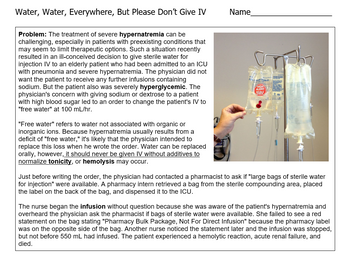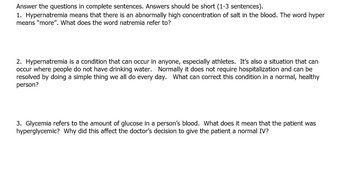
Human Anatomy & Physiology (11th Edition)
11th Edition
ISBN: 9780134580999
Author: Elaine N. Marieb, Katja N. Hoehn
Publisher: PEARSON
expand_more
expand_more
format_list_bulleted
Question
thumb_up100%

Transcribed Image Text:Water, Water, Everywhere, But Please Don't Give IV
Problem: The treatment of severe hypernatremia can be
challenging, especially in patients with preexisting conditions that
may seem to limit therapeutic options. Such a situation recently
resulted in an ill-conceived decision to give sterile water for
injection IV to an elderly patient who had been admitted to an ICU
with pneumonia and severe hypernatremia. The physician did not
want the patient to receive any further infusions containing
sodium. But the patient also was severely hyperglycemic. The
physician's concern with giving sodium or dextrose to a patient
with high blood sugar led to an order to change the patient's IV to
"free water" at 100 mL/hr.
"Free water" refers to water not associated with organic or
inorganic ions. Because hypernatremia usually results from a
deficit of "free water," it's likely that the physician intended to
replace this loss when he wrote the order. Water can be replaced
orally, however, it should never be given IV without additives to
normalize tonicity, or hemolysis may occur.
Name
ALERT
DE
Just before writing the order, the physician had contacted a pharmacist to ask if "large bags of sterile water
for injection" were available. A pharmacy intern retrieved a bag from the sterile compounding area, placed
the label on the back of the bag, and dispensed it to the ICU.
The nurse began the infusion without question because she was aware of the patient's hypernatremia and
overheard the physician ask the pharmacist if bags of sterile water were available. She failed to see a red
statement on the bag stating "Pharmacy Bulk Package, Not For Direct Infusion" because the pharmacy label
was on the opposite side of the bag. Another nurse noticed the statement later and the infusion was stopped,
but not before 550 mL had infused. The patient experienced a hemolytic reaction, acute renal failure, and
died.

Transcribed Image Text:Answer the questions in complete sentences. Answers should be short (1-3 sentences).
1. Hypernatremia means that there is an abnormally high concentration of salt in the blood. The word hyper
means "more". What does the word natremia refer to?
2. Hypernatremia is a condition that can occur in anyone, especially athletes. It's also a situation that can
occur where people do not have drinking water. Normally it does not require hospitalization and can be
resolved by doing a simple thing we all do every day. What can correct this condition in a normal, healthy
person?
3. Glycemia refers to the amount of glucose in a person's blood. What does it mean that the patient was
hyperglycemic? Why did this affect the doctor's decision to give the patient a normal IV?
Expert Solution
This question has been solved!
Explore an expertly crafted, step-by-step solution for a thorough understanding of key concepts.
This is a popular solution
Trending nowThis is a popular solution!
Step by stepSolved in 5 steps

Knowledge Booster
Learn more about
Need a deep-dive on the concept behind this application? Look no further. Learn more about this topic, biology and related others by exploring similar questions and additional content below.Similar questions
- Case Study: Suhar, a 13 year old male, visits the emergency room with an infected surgical wound. He broke his radius while skateboarding and had surgery to repair the break 6 days ago. Upon examination you notice that he has a fever and the tissue surrounding the surgical wound is black, swollen and draining a foarmy fluid. He tells you he has a headache and is unable to move the forearm due to pain. His medical records indicates that he is up to date on all his vaccinations. His mother tells you during the examination that his diet consists mostly of junk food and soda and that he has not been changing his wound dressing regularly. What infection does Suhar have and what organism causes it?arrow_forwardPatient A: Has Diabetes insipidus. They have polyuria and dilute urine. They present with some signs of sever dehydration including increased thirst, rapid respirations and rapid heart rate. Their blood pressure is low Patient B: Has Diabetes mellitus type 1. They are not taking medication for it. They are confused and lethargic. They are breathing heavy and fast and the breath has a fruity odor. They have polyuria and increased thirst. 4: For Patient A, the doctor orders a Head CT scan. She does not order this for Patient B. What would the doctor be looking for in the CT scan, and whywould this not be ordered for patient B?arrow_forwardParaphrase using simple words & please don’t use AI for paraphrasing 1. If you have normal blood pressure, your blood pressure is less than 120/80. The first, or “top” one, is your systolic blood pressure. The second, or “bottom,” one is diastolic blood pressure. 2. Elevated Blood Pressure. Elevated blood pressure is blood pressure that is slightly higher than normal. Diabetes,Unhealthy Diet,Physical Inactivity,Obesity,Too Much Alcohol,Tobacco Use ,Genetics and Family History. 3. 10 ways to control high blood pressure without medication:Lose extra pounds and watch your waistline. Blood pressure often increases as weight increases,Exercise regularly,Eat a healthy diet,Reduce salt (sodium) in your diet,Limit alcohol,Quit smoking,Get a good night's sleep,and reduce stress..arrow_forward
- tein X Case Studies.docx X + rl=https://wheatland.orbundsis.com/einstein-freshair/Videos/0216D9403D0ED43358766A676D8A4817/Case+Stuc TCentral | NBA... a Amazon.com: Onlin... (6) The Reason Why... Isaiah Blames Zora... Beyond The Lights... Case Study, Chapter 26, The Digestive System Mr. McArthur is hospitalized with pancreatitis and cholecystitis. Neither his gallbladdernor his pancreas are functioning normally at this time. The client is placed on a NPO (nothing by mouth) diet order, given intravenous fluids and pain medication. The nurse is aware that the pancreas has two functions: one being endocrine, secretion of hormones to assist with glucose control and the other being exocrine, aiding the digestive system. Mr. McArthur is scheduled for gallbladder removal in the morning to treat the cholecystitis. (Learning Objective 4) 1. The client asks what his gallbladder does. What is the nurse's best response? 2. The client also asks how the pancreas works to help with digestion. What…arrow_forwardA patient tells the nurse she is having pain in her rightlower leg. How does the nurse assess for the presence ofthrombophlebitis?a. By palpating the skin over the tibia and fibulab. By documenting daily calf circumference measurementsc. By recording vital signs obtained four times a dayd. By noting difficulty with ambulationarrow_forwardPlease help me fill in this chart. Thank youarrow_forward
arrow_back_ios
arrow_forward_ios
Recommended textbooks for you
 Human Anatomy & Physiology (11th Edition)BiologyISBN:9780134580999Author:Elaine N. Marieb, Katja N. HoehnPublisher:PEARSON
Human Anatomy & Physiology (11th Edition)BiologyISBN:9780134580999Author:Elaine N. Marieb, Katja N. HoehnPublisher:PEARSON Biology 2eBiologyISBN:9781947172517Author:Matthew Douglas, Jung Choi, Mary Ann ClarkPublisher:OpenStax
Biology 2eBiologyISBN:9781947172517Author:Matthew Douglas, Jung Choi, Mary Ann ClarkPublisher:OpenStax Anatomy & PhysiologyBiologyISBN:9781259398629Author:McKinley, Michael P., O'loughlin, Valerie Dean, Bidle, Theresa StouterPublisher:Mcgraw Hill Education,
Anatomy & PhysiologyBiologyISBN:9781259398629Author:McKinley, Michael P., O'loughlin, Valerie Dean, Bidle, Theresa StouterPublisher:Mcgraw Hill Education, Molecular Biology of the Cell (Sixth Edition)BiologyISBN:9780815344322Author:Bruce Alberts, Alexander D. Johnson, Julian Lewis, David Morgan, Martin Raff, Keith Roberts, Peter WalterPublisher:W. W. Norton & Company
Molecular Biology of the Cell (Sixth Edition)BiologyISBN:9780815344322Author:Bruce Alberts, Alexander D. Johnson, Julian Lewis, David Morgan, Martin Raff, Keith Roberts, Peter WalterPublisher:W. W. Norton & Company Laboratory Manual For Human Anatomy & PhysiologyBiologyISBN:9781260159363Author:Martin, Terry R., Prentice-craver, CynthiaPublisher:McGraw-Hill Publishing Co.
Laboratory Manual For Human Anatomy & PhysiologyBiologyISBN:9781260159363Author:Martin, Terry R., Prentice-craver, CynthiaPublisher:McGraw-Hill Publishing Co. Inquiry Into Life (16th Edition)BiologyISBN:9781260231700Author:Sylvia S. Mader, Michael WindelspechtPublisher:McGraw Hill Education
Inquiry Into Life (16th Edition)BiologyISBN:9781260231700Author:Sylvia S. Mader, Michael WindelspechtPublisher:McGraw Hill Education

Human Anatomy & Physiology (11th Edition)
Biology
ISBN:9780134580999
Author:Elaine N. Marieb, Katja N. Hoehn
Publisher:PEARSON

Biology 2e
Biology
ISBN:9781947172517
Author:Matthew Douglas, Jung Choi, Mary Ann Clark
Publisher:OpenStax

Anatomy & Physiology
Biology
ISBN:9781259398629
Author:McKinley, Michael P., O'loughlin, Valerie Dean, Bidle, Theresa Stouter
Publisher:Mcgraw Hill Education,

Molecular Biology of the Cell (Sixth Edition)
Biology
ISBN:9780815344322
Author:Bruce Alberts, Alexander D. Johnson, Julian Lewis, David Morgan, Martin Raff, Keith Roberts, Peter Walter
Publisher:W. W. Norton & Company

Laboratory Manual For Human Anatomy & Physiology
Biology
ISBN:9781260159363
Author:Martin, Terry R., Prentice-craver, Cynthia
Publisher:McGraw-Hill Publishing Co.

Inquiry Into Life (16th Edition)
Biology
ISBN:9781260231700
Author:Sylvia S. Mader, Michael Windelspecht
Publisher:McGraw Hill Education